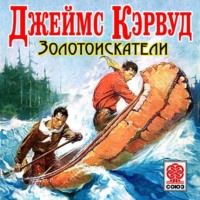
The Valley of Silent Men
Knowing that it would be fatal to his scheme if he were found on his feet, he returned to his bed. The flush of his exertion and excitement was still in his face when Doctor Cardigan came half an hour later.
Within the next few minutes he put Cardigan more at his ease than he had been during the preceding day and night. It was, after all, an error which made him happier the more he thought about it, he told the surgeon. He admitted that at first the discovery that he was going to live had horrified him. But now the whole thing bore a different aspect for him. As soon as he was sufficiently strong, he would begin gathering the evidences for his alibi, and he was confident of proving himself innocent of John Barkley's murder.
He anticipated ten years in the Edmonton penitentiary. But what were ten years there as compared with forty or fifty under the sod? He wrung Cardigan's hand. He thanked him for the splendid care he had given him. It was he, Cardigan, who had saved him from the grave, he said – and Cardigan grew younger under his eyes.
"I thought you'd look at it differently, Kent," he said, drawing in a deep breath. "My God, when I found I had made that mistake – "
"You figured you were handing me over to the hangman," smiled Kent. "It's true I shouldn't have made that confession, old man, if I hadn't rated you right next to God Almighty when it came to telling whether a man was going to live or die. But we all make slips. I've made 'em. And you've got no apology to make. I may ask you to send me good cigars now and then while I'm in retirement at Edmonton, and I shall probably insist that you come to smoke with me occasionally and tell me the news of the rivers. But I'm afraid, old chap, that I'm going to worry you a bit more here. I feel queer today, queer inside me. Now it would be a topping joke if some other complication should set in and fool us all again, wouldn't it?"
He could see the impression he was making on Cardigan. Again his faith in the psychology of the mind found its absolute verification. Cardigan, lifted unexpectedly out of the slough of despond by the very man whom he expected to condemn him, became from that moment, in the face of the mental reaction, almost hypersympathetic. When finally he left the room, Kent was inwardly rejoicing. For Cardigan had told him it would be some time before he was strong enough to stand on his feet.
He did not see Mercer all the rest of that day. It was Cardigan who personally brought his dinner and his supper and attended him last at night. He asked not to be interrupted again, as he felt that he wanted to sleep. There was a guard outside his door now.
Cardigan scowled when he volunteered this information. It was sheer nonsense in Kedsty taking such a silly precaution. But he would give the guard rubber-soled shoes and insist that he make no sound that would disturb him. Kent thanked him, and grinned exultantly when he was gone.
He waited until his watch told him it was ten o'clock before he began the exercise which he had prescribed for himself. Noiselessly he rolled out of bed. There was no sensation of dizziness when he stood on his feet this time. His head was as clear as a bell. He began experimenting by inhaling deeper and still deeper breaths and by straightening his chest.
There was no pain, as he had expected there would be. He felt like crying out in his joy. One after the other he stretched up his arms. He bent over until the tips of his fingers touched the floor. He crooked his knees, leaned from side to side, changed from one attitude to another, amazed at the strength and elasticity of his body. Twenty times, before he returned to his bed, he walked back and forth across his room.
He was sleepless. Lying with his back to the pillows he looked out into the starlight, watching for the first glow of the moon and listening again to the owls that had nested in the lightning-shriven tree. An hour later he resumed his exercise.
He was on his feet when through his window he heard the sound of approaching voices and then of running feet. A moment later some one was pounding at a door, and a loud voice shouted for Doctor Cardigan. Kent drew cautiously nearer the window. The moon had risen, and he saw figures approaching, slowly, as if weighted under a burden. Before they turned out of his vision, he made out two men bearing some heavy object between them. Then came the opening of a door, other voices, and after that an interval of quiet.
He returned to his bed, wondering who the new patient could be.
He was breathing easier after his exertion. The fact that he was feeling keenly alive, and that the thickening in his chest was disappearing, flushed him with elation. An unbounded optimism possessed him. It was late when he fell asleep, and he slept late. It was Mercer's entrance into his room that roused him. He came in softly, closed the door softly, yet Kent heard him. The moment he pulled himself up, he knew that Mercer had a report to make, and he also saw that something upsetting had happened to him. Mercer was a bit excited.
"I beg pardon for waking you, sir," he said, leaning close over Kent, as though fearing the guard might be listening at the door. "But I thought it best for you to hear about the Indian, sir."
"The Indian?"
"Yes, sir – Mooie, sir. I am quite upset over it, Mr. Kent. He told me early last evening that he had found the scow on which the girl was going down-river. He said it was hidden in Kim's Bayou."
"Kim's Bayou! That was a good hiding-place, Mercer!"
"A very good place of concealment indeed, sir. As soon as it was dark, Mooie returned to watch. What happened to him I haven't fully discovered, sir. But it must have been near midnight when he staggered up to Crossen's place, bleeding and half out of his senses. They brought him here, and I watched over him most of the night. He says the girl went aboard the scow and that the scow started down-river. That much I learned, sir. But all the rest he mumbles in a tongue I can not understand. Crossen says it's Cree, and that old Mooie believes devils jumped on him with clubs down at Kim's Bayou. Of course they must have been men. I don't believe in Mooie's devils, sir."
"Nor I," said Kent, the blood stirring strangely in his veins. "Mercer, it simply means there was some one cleverer than old Mooie watching that trail."
With a curiously tense face Mercer was looking cautiously toward the door. Then he leaned still lower over Kent.
"During his mumblings, when I was alone with him, I heard him speak a name, sir. Half a dozen times, sir – and it was —Kedsty!"
Kent's fingers gripped the young Englishman's hand.
"You heard that, Mercer?"
"I am sure I could not have been mistaken, sir. It was repeated a number of times."
Kent fell back against his pillows. His mind was working swiftly. He knew that behind an effort to appear calm Mercer was uneasy over what had happened.
"We mustn't let this get out, Mercer," he said. "If Mooie should be badly hurt – should die, for instance – and it was discovered that you and I – "
He knew he had gone far enough to give effect to his words. He did not even look at Mercer.
"Watch him closely, old man, and report to me everything that happens. Find out more about Kedsty, if you can. I shall advise you how to act. It is rather ticklish, you know – for you! And" – he smiled at Mercer – "I'm unusually hungry this morning. Add another egg, will you, Mercer? Three instead of two, and a couple of extra slices of toast. And don't let any one know that my appetite is improving. It may be best for both of us – especially if Mooie should happen to die. Understand, old man?"
"I – I think I do, sir," replied Mercer, paling at the grimly smiling thing he saw in Kent's eyes. "I shall do as you say, sir."
When he had gone, Kent knew that he had accurately measured his man. True to a certain type, Mercer would do a great deal for fifty dollars – under cover. In the open he was a coward. And Kent knew the value of such a man under certain conditions. The present was one of those conditions. From this hour Mercer would be a priceless asset to his scheme for personal salvation.
CHAPTER IX
That morning Kent ate a breakfast that would have amazed Doctor Cardigan and would have roused a greater caution in Inspector Kedsty had he known of it. While eating he strengthened the bonds already welded between himself and Mercer. He feigned great uneasiness over the condition of Mooie, who he knew was not fatally hurt because Mercer had told him there was no fracture. But if he should happen to die, he told Mercer, it would mean something pretty bad for them, if their part in the affair leaked out.
As for himself, it would make little difference, as he was "in bad" anyway. But he did not want to see a good friend get into trouble on his account. Mercer was impressed. He saw himself an instrument in a possible murder affair, and the thought terrified him. Even at best, Kent told him, they had given and taken bribes, a fact that would go hard with them unless Mooie kept his mouth shut. And if the Indian knew anything out of the way about Kedsty, it was mighty important that he, Mercer, get hold of it, for it might prove a trump card with them in the event of a showdown with the Inspector of Police. As a matter of form, Mercer took his temperature. It was perfectly normal, but it was easy for Kent to persuade a notation on the chart a degree above.
"Better keep them thinking I'm still pretty sick," he assured Mercer. "They won't suspect there is anything between us then."
Mercer was so much in sympathy with the idea that he suggested adding another half-degree.
It was a splendid day for Kent. He could feel himself growing stronger with each hour that passed. Yet not once during the day did he get out of his bed, fearing that he might be discovered. Cardigan visited him twice and had no suspicion of Mercer's temperature chart. He dressed his wound, which was healing fast. It was the fever which depressed him. There must be, he said, some internal disarrangement which would soon clear itself up. Otherwise there seemed to be no very great reason why Kent should not get on his feet. He smiled apologetically.
"Seems queer to say that, when a little while ago I was telling you it was time to die," he said.
That night, after ten o'clock, Kent went through his setting-up exercises four times. He marveled even more than the preceding night at the swiftness with which his strength was returning. Half a dozen times the little devils of eagerness working in his blood prompted him to take to the window at once.
For three days and nights thereafter he kept his secret and added to his strength. Doctor Cardigan came in to see him at intervals, and Father Layonne visited him regularly every afternoon. Mercer was his most frequent visitor. On the third day two things happened to create a little excitement. Doctor Cardigan left on a four-day journey to a settlement fifty miles south, leaving Mercer in charge – and Mooie came suddenly out of his fever into his normal senses again. The first event filled Kent with joy. With Cardigan out of the way there would be no immediate danger of the discovery that he was no longer a sick man. But it was the recovery of Mooie from the thumping he had received about the head that delighted Mercer. He was exultant. With the quick reaction of his kind he gloated over the fact before Kent. He let it be known that he was no longer afraid, and from the moment Mooie was out of danger his attitude was such that more than once Kent would have taken keen pleasure in kicking him from the room. Also, from the hour he was safely in charge of Doctor Cardigan's place, Mercer began to swell with importance. Kent saw the new danger and began to humor him. He flattered him. He assured him that it was a burning shame Cardigan had not taken him into partnership. He deserved it. And, in justice to himself, Mercer should demand that partnership when Cardigan returned. He, Kent, would talk to Father Layonne about it, and the missioner would spread the gospel of what ought to be among others who were influential at the Landing. For two days he played with Mercer as an angler plays with a treacherous fish. He tried to get Mercer to discover more about Mooie's reference to Kedsty. But the old Indian had shut up like a clam.
"He was frightened when I told him he had said things about the Inspector," Mercer reported. "He disavowed everything. He shook his head – no, no, no. He had not seen Kedsty. He knew nothing about him. I can do nothing with him, Kent."
He had dropped his "sirs," also his servant-like servility. He helped to smoke Kent's cigars with the intimacy of proprietorship, and with offensive freedom called him "Kent." He spoke of the Inspector as "Kedsty," and of Father Layonne as "the little preacher." He swelled perceptibly, and Kent knew that each hour of that swelling added to his own danger.
He believed that Mercer was talking. Several times a day he heard him in conversation with the guard, and not infrequently Mercer went down to the Landing, twirling a little reed cane that he had not dared to use before. He began to drop opinions and information to Kent in a superior sort of way. On the fourth day word came that Doctor Cardigan would not return for another forty-eight hours, and with unblushing conceit Mercer intimated that when he did return he would find big changes. Then it was that in the stupidity of his egotism he said:
"Kedsty has taken a great fancy to me, Kent. He's a square old top, when you take him right. Had me over this afternoon, and we smoked a cigar together. When I told him that I looked in at your window last night and saw you going through a lot of exercises, he jumped up as if some one had stuck a pin in him. 'Why, I thought he was sick —bad!' he said. And I let him know there were better ways of making a sick man well than Cardigan's. 'Give them plenty to eat,' I said. 'Let 'em live normal,' I argued. 'Look at Kent, for instance,' I told him. 'He's been eating like a bear for a week, and he can turn somersaults this minute!' That topped him over, Kent. I knew it would be a bit of a surprise for him, that I should do what Cardigan couldn't do. He walked back and forth, black as a hat – thinking of Cardigan, I suppose. Then he called in that Pelly chap and gave him something which he wrote on a piece of paper. After that he shook hands with me, slapped me on the shoulder most intimately, and gave me another cigar. He's a keen old blade, Kent. He doesn't need more than one pair of eyes to see what I've done since Cardigan went away!"
If ever Kent's hands had itched to get at the throat of a human being, the yearning convulsed his fingers now. At the moment when he was about to act Mercer had betrayed him to Kedsty! He turned his face away so that Mercer could not see what was in his eyes. Under his body he concealed his clenched hands. Within himself he fought against the insane desire that was raging in his blood, the desire to leap on Mercer and kill him. If Cardigan had reported his condition to Kedsty, it would have been different. He would have accepted the report as a matter of honorable necessity on Cardigan's part. But Mercer – a toad blown up by his own wind, a consummate fiend who would sell his best friend, a fool, an ass —
For a space he held himself rigid as a stone, his face turned away from Mercer. His better sense won. He knew that his last chance depended upon his coolness now. And Mercer unwittingly helped him to win by slyly pocketing a couple of his cigars and leaving the room. For a minute or two Kent heard him talking to the guard outside the door.
He sat up then. It was five o'clock. How long ago was it that Mercer had seen Kedsty? What was the order that the Inspector had written on a sheet of paper for Constable Pelly? Was it simply that he should be more closely watched, or was it a command to move him to one of the cells close to the detachment office? If it was the latter, all his hopes and plans were destroyed. His mind flew to those cells.
The Landing had no jail, not even a guard-house, though the members of the force sometimes spoke of the cells just behind Inspector Kedsty's office by that name. The cells were of cement, and Kent himself had helped to plan them! The irony of the thing did not strike him just then. He was recalling the fact that no prisoner had ever escaped from those cement cells. If no action were taken before six o'clock, he was sure that it would be postponed until the following morning. It was possible that Kedsty's order was for Pelly to prepare a cell for him. Deep in his soul he prayed fervently that it was only a matter of preparation. If they would give him one more night – just one!
His watch tinkled the half-hour. Then a quarter of six. Then six. His blood ran feverishly, in spite of the fact that he possessed the reputation of being the coolest man in N Division. He lighted his last cigar and smoked it slowly to cover the suspense which he feared revealed itself in his face, should any one come into his room. His supper was due at seven. At eight it would begin to get dusk. The moon was rising later each night, and it would not appear over the forests until after eleven. He would go through his window at ten o'clock. His mind worked swiftly and surely as to the method of his first night's flight. There were always a number of boats down at Crossen's place. He would start in one of these, and by the time Mercer discovered he was gone, he would be forty miles on his way to freedom. Then he would set his boat adrift, or hide it, and start cross-country until his trail was lost. Somewhere and in some way he would find both guns and food. It was fortunate that he had not given Mercer the other fifty dollars under his pillow.
At seven Mercer came with his supper. A little gleam of disappointment shot into his pale eyes when he found the last cigar gone from the box. Kent saw the expression and tried to grin good-humoredly.
"I'm going to have Father Layonne bring me up another box in the morning, Mercer," he said. "That is, if I can get hold of him."
"You probably can," snapped Mercer. "He doesn't live far from barracks, and that's where you are going. I've got orders to have you ready to move in the morning."
Kent's blood seemed for an instant to flash into living flame. He drank a part of his cup of coffee and said then, with a shrug of his shoulders: "I'm glad of it, Mercer. I'm anxious to have the thing over. The sooner they get me down there, the quicker they will take action. And I'm not afraid, not a bit of it. I'm bound to win. There isn't a chance in a hundred that they can convict me." Then he added: "And I'm going to have a box of cigars sent up to you, Mercer. I'm grateful to you for the splendid treatment you have given me."
No sooner had Mercer gone with the supper things than Kent's knotted fist shook itself fiercely in the direction of the door.
"My God, how I'd like to have you out in the woods – alone – for just one hour!" he whispered.
Eight o'clock came, and nine. Two or three times he heard voices in the hall, probably Mercer talking with the guard. Once he thought he heard a rumble of thunder, and his heart throbbed joyously. Never had he welcomed a storm as he would have welcomed it tonight. But the skies remained clear. Not only that, but the stars as they began to appear seemed to him more brilliant than he had ever seen them before. And it was very still. The rattle of a scow-chain came up to him from the river as though it were only a hundred yards away. He knew that it was one of Mooie's dogs he heard howling over near the sawmill. The owls, flitting past his window, seemed to click their beaks more loudly than last night. A dozen times he fancied he could hear the rippling voice of the river that very soon was to carry him on toward freedom.
The river! Every dream and aspiration found its voice for him in that river now. Down it Marette Radisson had gone. And somewhere along it, or on the river beyond, or the third river still beyond that, he would find her. In the long, tense wait between the hours of nine and ten he brought the girl back into his room again. He recalled every gesture she had made, every word she had spoken. He felt the thrill of her hand on his forehead, her kiss, and in his brain her softly spoken words repeated themselves over and over again, "I think that if you lived very long I should love you." And as she had spoken those words she knew that he was not going to die!
Why, then, had she gone away? Knowing that he was going to live, why had she not remained to help him if she could? Either she had spoken the words in jest, or —
A new thought flashed into his mind. It almost drew a cry from his lips. It brought him up tense, erect, his heart pounding. Had she gone away? Was it not possible that she, too, was playing a game in giving the impression that she was leaving down-river on the hidden scow? Was it conceivable that she was playing that game against Kedsty? A picture, clean-cut as the stars in the sky, began to outline itself in his mental vision. It was clear, now, what Mooie's mumblings about Kedsty had signified. Kedsty had accompanied Marette to the scow. Mooie had seen him and had given the fact away in his fever. Afterward he had clamped his mouth shut through fear of the "big man" of the Law. But why, still later, had he almost been done to death? Mooie was a harmless creature. He had no enemies.
There was no one at the Landing who would have assaulted the old trailer, whose hair was white with age. No one, unless it was Kedsty himself – Kedsty at bay, Kedsty in a rage. Even that was inconceivable. Whatever the motive of the assault might be, and no matter who had committed it, Mooie had most certainly seen the Inspector of Police accompany Marette Radisson to the scow. And the question which Kent found it impossible to answer was, had Marette Radisson really gone down the river on that scow?
It was almost with a feeling of disappointment that he told himself it was possible she had not. He wanted her on the river. He wanted her going north and still farther north. The thought that she was mixed up in some affair that had to do with Kedsty was displeasing to him. If she was still in the Landing or near the Landing, it could no longer be on account of Sandy McTrigger, the man his confession had saved. In his heart he prayed that she was many days down the Athabasca, for it was there – and only there – that he would ever see her again. And his greatest desire, next to his desire for his freedom, was to find her. He was frank with himself in making that confession. He was more than that. He knew that not a day or night would pass that he would not think or dream of Marette Radisson. The wonder of her had grown more vivid for him with each hour that passed, and he was sorry now that he had not dared to touch her hair. She would not have been offended with him, for she had kissed him – after he had killed the impulse to lay his hand on that soft glory that had crowned her head.
And then the little bell in his watch tinkled the hour of ten! He sat up with a jerk. For a space he held his breath while he listened. In the hall outside his room there was no sound. An inch at a time he drew himself off his bed until he stood on his feet. His clothes hung on hooks in the wall, and he groped his way to them so quietly that one listening at the crack of his door would not have heard him. He dressed swiftly. Then he made his way to the window, looked out, and listened.
In the brilliant starlight he saw nothing but the two white stubs of the lightning-shattered trees in which the owls lived. And it was very still. The air was fresh and sweet in his face. In it he caught the scent of the distant balsams and cedars. The world, wonderful in its night silence, waited for him. It was impossible for him to conceive of failure or death out there, and it seemed unreal and trivial that the Law should expect to hold him, with that world reaching out its arms to him and calling him.
Assured that the moment for action was at hand, he moved quickly. In another ten seconds he was through the window, and his feet were on the ground. For a space he stood out clear in the starlight. Then he hurried to the end of the building and hid himself in the shadow. The swiftness of his movement had brought him no physical discomfort, and his blood danced with the thrill of the earth under his feet and the thought that his wound must be even more completely healed than he had supposed. A wild exultation swept over him. He was free! He could see the river now, shimmering and talking to him in the starlight, urging him to hurry, telling him that only a little while ago another had gone north on the breast of it, and that if he hastened it would help him to overtake her. He felt the throb of new life in his body. His eyes shone strangely in the semi-gloom.









